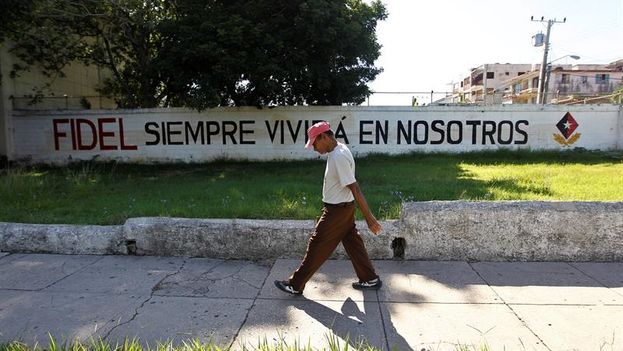
![]() 14ymedio, Reinaldo Escobar, 14 August 2017 — With so much secrecy, so much myth and legend, it is not even known for sure if this August 13 was the actual date of the 91st anniversary of Fidel Castro’s birth. His life was so surrounded by exaggerations and lies that even the moment he was born and the name with which he was registered are open to question.
14ymedio, Reinaldo Escobar, 14 August 2017 — With so much secrecy, so much myth and legend, it is not even known for sure if this August 13 was the actual date of the 91st anniversary of Fidel Castro’s birth. His life was so surrounded by exaggerations and lies that even the moment he was born and the name with which he was registered are open to question.
However, beyond any doubt, the day was propitious to reflect on the legacy of the former Cuban president, an imprint that has been reduced in officialdom’s Conceptualization of the Socialist Model to “his concept of Revolution” and the stubborn “conviction that yes we can achieve victory” with our own efforts.
That concept of “Revolution” – which is presented as his political will – is so ambiguous that it can be taken both as a result obtained and as a goal to be achieved. This theoretical hodgepodge is evidence of the lack of depth of the author’s thinking and his tendency to political opportunism, which allowed him to create slogans to encapsulate different moments.
Official media reproduce such a definition as a method for achieving dissimilar goals, the final fruit of a process or a tangle of moral values close to the commandments of good behavior. However, in the absence of the violent component – which typifies any academic definition of Revolution – lies its main failure, to which is added the absence of the class approach that could be expected from a Marxist-Leninist.
The main teaching Fidel Castro has left us, which teachers warn their students they should pay attention to because “it will be on the test,” is voluntarism. The Commander-in-Chief instilled the idea that whomever is willing to defend a position at the risk of his own and others’ deaths, becomes invincible.
It does not matter if the cause to be defended is erroneous or valid. The cardinal rule, according to this theorem, is to accept a goal with unlimited enthusiasm and persevere in its realization at whatever price necessary.
Examples are the eradication of all vestiges of private property during the Revolutionary Offensive of 1968, the 1970 sugar harvest which attempted to yield 10 million tons of sugar, the idle effort to genetically transform livestock,or the purpose of combining study with work in the forgotten Schools in the Countryside. Along with these is a long list in which we should mention the energy revolution, the municipalization of universities and the extension of the cultivation of moringa.
Intensive grazing brought to Cuba by a French scientist, construction ‘microbrigades’, consecration in scientific research centers, special programs of rabbits, geese or buffalo, the doctor for 120 families, all called by the name ‘Plan Fidel’ and many other initiatives carried the personal imprint of one who considered himself an indisputable specialist on any subject he was superficially interested in.
Nothing and no one could stop Fidel Castro, except his own indiscipline and the sudden reluctance that came over him when he discovered some new object of obsession.
A monument recently erected in Crimea to his memory says that “victory is perseverance,” a bitter reminder that Fidel Castro was the worst disciple of his own teachings. He was only consistent in the act of never admitting that he was defeated, as defined in his favorite motto: “turning the setback into victory.”
Athletes may be able to inherit their legacy to win a competition seemingly against them, but in politics and economics it is nefarious to obsess over an apparently miraculous solution.
One should not persevere in the error, is also what we learned from Fidel Castro.
